 Mysteries
Mysteries  Mysteries
Mysteries  History
History 10 Surprising Stories About the Texas Rangers
 Humans
Humans 10 Philosophers Who Were Driven Mad by Their Own Theories
 Miscellaneous
Miscellaneous 10 Video-Game-Worthy Weapons and Armors from History
 Weird Stuff
Weird Stuff 10 Psychics Who Accurately Predicted Wartime Events
 The Arts
The Arts 10 Pieces of Art Inspired by a Broken Heart
 Health
Health 10 Science Fiction-Sounding New Medical Treatments
 History
History 10 Surprising Facts About the Father of Submarine Warfare
 Space
Space Ten Astonishing New Insights into Alien Worlds
 Weird Stuff
Weird Stuff 10 Bizarre Summer Solstice Rituals Still Practiced Today
 Mysteries
Mysteries Top 10 Haunting Facts About the Ghost Ship MV Alta
 History
History 10 Surprising Stories About the Texas Rangers
 Humans
Humans 10 Philosophers Who Were Driven Mad by Their Own Theories
Who's Behind Listverse?

Jamie Frater
Head Editor
Jamie founded Listverse due to an insatiable desire to share fascinating, obscure, and bizarre facts. He has been a guest speaker on numerous national radio and television stations and is a five time published author.
More About Us Miscellaneous
Miscellaneous 10 Video-Game-Worthy Weapons and Armors from History
 Weird Stuff
Weird Stuff 10 Psychics Who Accurately Predicted Wartime Events
 The Arts
The Arts 10 Pieces of Art Inspired by a Broken Heart
 Health
Health 10 Science Fiction-Sounding New Medical Treatments
 History
History 10 Surprising Facts About the Father of Submarine Warfare
 Space
Space Ten Astonishing New Insights into Alien Worlds
 Weird Stuff
Weird Stuff 10 Bizarre Summer Solstice Rituals Still Practiced Today
10 Decadent Facts About Oscar Wilde
Literary geniuses are often known for their works and their lifestyles. Some are fabulous playwrights. Others produce novels and smaller books that make them famous. Many are linguists and poets who have a penchant for the odd, the quirky, and the downright strange.
Beyond their works, their lives can be filled with love, romance, depravity, and debauchery. How many literary figures can honestly fit all these amazing and wild things into their lives?
Actually, there is one man who was all these things. He was salacious, decadent, sexual, and literarily risque, and the world loved him. Born in Ireland and taking over the globe one grandiose moment at a time, Oscar Wilde rocked the world with his lush lifestyle, his decadent take on life, and his sordid and passionate love affairs.
But there is more to the life of Oscar Wilde than witticisms and Dorian Gray. He is a man that led a life that was full of brilliant languages, love affairs, and fabulous aestheticism. Wilde lived life in the fast lane when so many of the time were moving in slow motion.
10 Wilde Was Extremely Well Educated
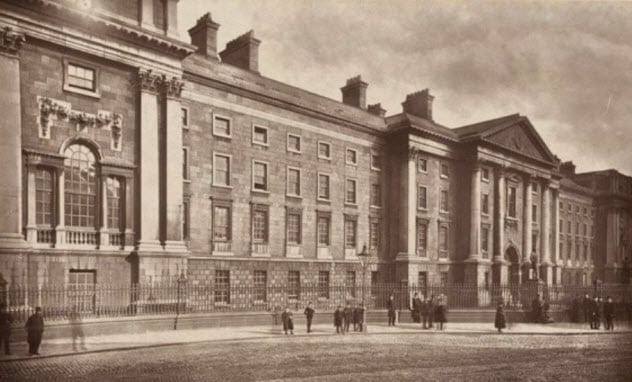
Early in life, Oscar Wilde was an extremely bright child who was in love with books and literature. At an early age, he started his educational studies at Portora Royal at Enniskillen. During his time there, he began his first love affair—with Greek and Roman studies. He also won the school’s top prize for classics students as well as second prize for art and drawing during his final year.
His academic aptitude served him well as he was awarded the Royal School Scholarship to attend Trinity College in Dublin upon his graduation in 1871. At Trinity College, Wilde again showed his academic prowess by performing wonderfully. Mastering his courses in classics under the tutelage of Professor Sir John Pentland Mahaffy, Wilde ranked first in his examination in 1872, earning yet another foundation scholarship.[1]
In 1874, Wilde’s academic successes won him the college’s Berkeley Gold Medal for Greek. He was awarded another scholarship, this time to the illustrious Oxford University. While there, he continued his studies but also became involved in the Aesthetic Movement and became an advocate for “art for art’s sake.”
In his last year at Oxford, Wilde won the Newdigate Prize for his poem “Ravenna.”
9 Wilde Was A Proponent Of Aestheticism
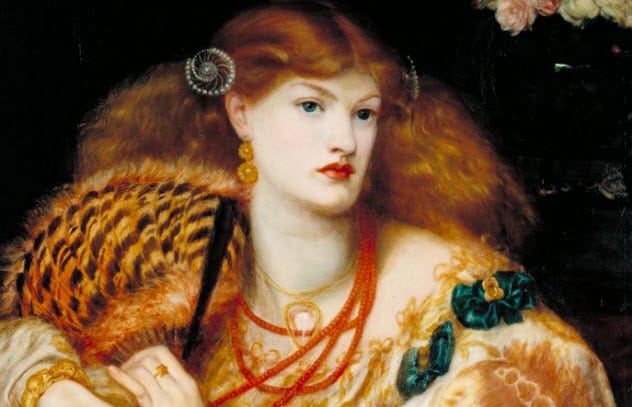
During the latter part of the 19th century, Britain was being culturally changed by the Aesthetic Movement (aka “art for art’s sake”). This cultural movement was based on the idea that beauty is the most important thing in life. Writers and other artists of the time created works based on this philosophy that were simply to be admired for their beauty and not for their narrative or moral functions.[2]
Immediately drawn to the movement, Wilde submersed himself in the aesthetic lifestyle. He even made the grandiose claim that he was “the high priest of aesthetics” and that his messages on the ideals were to be believed because he truly worshiped the beauty of life and art.
Given his passion, he became somewhat the authority on the subject, claiming that living aesthetically was his vocation. Aestheticism to Wilde meant to break out of the preconceived notion of how one should act and behave. He believed that one should break free of those societal constraints and act in a beautiful and purely free way to achieve absolute happiness.
8 Wilde Only Published One True Novel

When one thinks of Oscar Wilde, The Picture of Dorian Gray immediately comes to mind as it is his most notable novel. What other novels come to mind? The correct answer would be none.
He published only one full-length novel during his lifetime. While working as an editor for Lady’s World, Wilde was struck with an intense bout of creativity, and during seven years, he created nearly all of his most significant works. 1891 marks the publication of Dorian Gray, his first and only novel.
However, during the rest of those years, Wilde was busy creating many other works, including many poetic publications. In 1888, he wrote a collection of children’s short stories titled The Happy Prince and Other Tales. As an indulgent proponent of aestheticism and the lifestyle it promoted, he produced a collection of essays titled Intentions which argued the tenets of aestheticism to the masses.[3]
Along with poems, a novel, and other prose, Wilde was also famous in the theatrical circuit for his skills as a playwright. During the late 1800s, Wilde produced many scripts that were performed around Britain. Perhaps the best-known was The Importance of Being Earnest, a whimsical satire about Victorian society.
7 Incredible Linguist
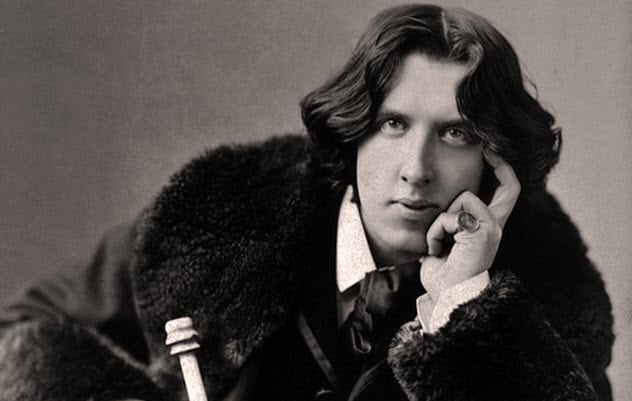
Yes, Wilde published many works. But beyond the scope of his literary prowess, he was in general an amazing linguist. Often referred to as the “lord of language,” Wilde used English as an actual tool to show the beautiful nature of the language itself.
He had a talent for using rhetorical devices, harmonious diction, paradoxical language, and witty dialogue to create masterful pieces of literary art. Apart from being able to write like a lyricist, Wilde was also multilingual. He studied Greek for nearly nine years. Ultimately, he became fluent in English, German, and French. Though not fluent, he was able to conversationally speak Italian and Greek.
Wilde was born and raised in Ireland and was constantly surrounded by Gaelic, the Celtic language that is the traditional formal language of Ireland. However, he could not speak the Irish language of his homeland.
Always one for humor and jest, Wilde’s supposed last words were: “This wallpaper and I are fighting a duel to the death. Either it goes or I do.”[4] Needless to say, the wallpaper won the duel in November 1900.
6 Oscar And Bosie: A Love Story
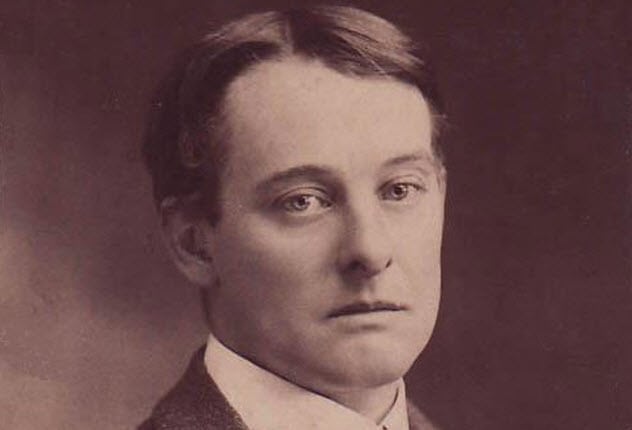
Though Oscar Wilde was married and sired children, perhaps his greatest remembrances about love come from his homosexual affairs. His best-known relationship started in 1891 when he met and fell for Oxford undergraduate Lord Alfred Douglas, affectionately known as “Bosie.”
Almost immediately, their love blossomed into a beautiful relationship. Bosie quickly became Oscar’s very own Dorian Gray—his muse, his evil genius, and, of course, his lover. During this time, Wilde produced many literary pieces, including Salome, which have stood the test of time as some of his greatest legacy works.
The relationship between these two men is best told through a series of imaginative and romantic love letters. Oscar and Bosie corresponded affectionately for years. Wilde wrote to Bosie, “My own Dear Boy, I can’t live without you. You are so dear, so wonderful.”[5]
Though their love affair was romantic and storied, it came to a complete halt when Bosie’s father discovered the relationship between Wilde and Bosie.
5 Oscar Went To Prison For His Sexual Relationship
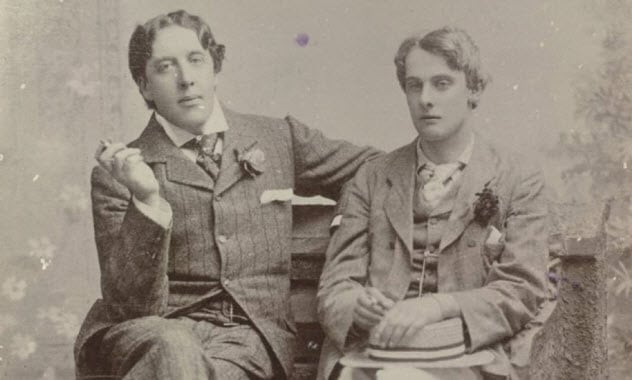
Wilde’s lover also brought about his demise. Though they were passionate about each other, Bosie had some personality traits that made him a somewhat difficult person. He was a spoiled dandy who was debauched and extremely clever, traits which first lured Wilde to him. Bosie also leaned heavily on Wilde for money and forgiveness and, for a time, got them.
However, their relationship was quite toxic at times, which led to the demise of their great love affair and Wilde’s imprisonment. During their relationship, Wilde wrote Salome in French. Bosie translated it into English for Wilde, who did not like the translation. He felt that it was misinterpreted and mistranslated.
This caused an explosion between the two lovers and led to Bosie’s father, John Douglas of Queensberry, getting involved. Irritated by the constant trials and tribulations of his son, John Douglas wrote Bosie a letter in which he told his son that he “detested him.” However, in order to save the name of the family, John Douglas, a pious man who would not stand for homosexuality, went after Wilde.
John Douglas accused Wilde of sodomy and indecency with his son Bosie. Wilde countered with a suit of libel against John Douglas. During this time, homosexuality was not tolerated and John Douglas won the case. Meanwhile, Wilde was arrested on charges of gross indecency.[6]
He was sentenced to two years in prison, which the judge believed to be inadequate for Wilde’s crime of being homosexual. The two-year sentence eventually broke poor Wilde both physically and emotionally. Allowed paper and pen in prison, he only wrote one piece, De Profundis (Latin for “from the depths”).
This piece was a long, harrowing letter of finality from Wilde to his lover, Bosie. It talked about their dysfunctional relationship and how Bosie’s father was the sole reason for Wilde’s trial and imprisonment. It can also be viewed as Wilde’s autobiographical attempt to understand his own life and work as it reflected on art, love, and his own character and failings.
4 Oscar Had A Friend To The Grave
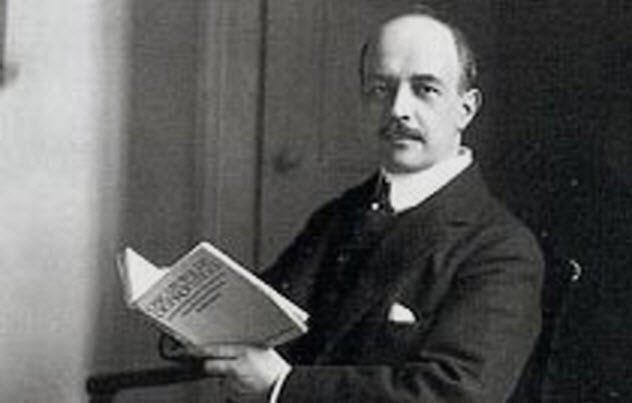
Though his scandalous affair with Bosie took the spotlight, one man was constantly by Wilde’s side, no matter the circumstances. Often considered his first love, Robert “Robbie” Ross was Oscar’s longtime friend, lover, and confidant.
In 1886, Oscar met Ross, who is often noted as the “first boy to corrupt Oscar” because homosexuality was a crime then. Ross was also a friend of Bosie, and the three worked together on Salome. Although Wilde was imprisoned after this thanks to the Douglas crew, that did not deter young Robbie.
He never gave up on Oscar and visited him regularly in prison. Appreciating Ross’s loyalty and friendship through the years, Oscar made Ross his literary executor after his release from prison. After Wilde’s death, Ross eventually paid off Oscar’s innumerable debts to creditors as well as annulled the bankruptcy of Oscar’s estate.[7]
Though the sexual aspect of Ross and Wilde’s relationship was small, their friendship stood the test of time and went all the way to the grave. So close were Ross and Wilde that upon his death, Ross was entombed with Oscar. The two are buried together in a monument in Pere Lachaise Cemetery in Paris.
3 Oscar Wilde May Not Have Written One Of His Famous Quotes

“Be yourself. Everyone else is already taken.” That quote is often attributed to Oscar Wilde. However, there is no substantive evidence that he ever said this.
In the extensive literary collection called The Wit and Wisdom of Oscar Wilde by Ralph Keyes, there is no record of this ever being said. Wilde did make several remarks about identity and appearance, but those were most tightly joined with his thoughts on the Aesthetic Movement and not on actually “being yourself.”[8]
The first and closest thematic review of the quote actually dates back to 1967. Thomas Merton composed a memoir published by The Hudson Review in which he speaks of “being yourself.” This matches the tone and composition of the quote in question. Many believe that the saying, already being interpreted vaguely from Merton, was attributed to Oscar Wilde because of his many witty quotes and anecdotes.
2 Oscar Wilde Made His Mark In Rock ‘n’ Roll
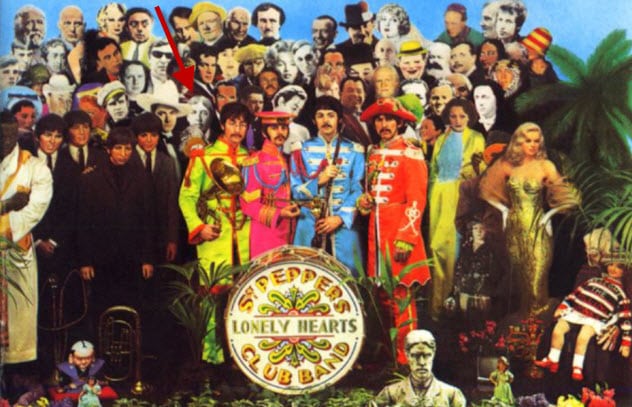
Well after his death, Oscar Wilde was still making a name for himself. This time, it was in the swinging ’60s when both The Beatles and The Rolling Stones used Wilde in their albums.
John Lennon, an Oscar Wilde fanatic, claimed that Wilde was one of his biggest poetic role models. Adored so much by Lennon, Oscar even made the front cover of the Sgt. Pepper’s Lonely Hearts Club Band album, taking his spot right behind Lennon himself.
Not long after this, the Rolling Stones jumped on the Oscar Wilde bandwagon. Shortly after their infamous drug bust, Mick Jagger and the Stones released the song “We Love You.”
The song was a bit of a thank you note to friends for their support but also a cry at the unjust nature of the charges and arrest. Director Peter Whitehead was called in to make a promotional film to go along with the song based on the trial of Oscar Wilde. Mick Jagger donned the garb and aesthetic of Wilde and portrayed him in rock star fashion.[9]
1 Oscar Wilde And His Grave Of Kisses

Oscar Wilde had an amazing life. Love affairs, scandals, literature, and love. The man was adored by those who knew him. Even after his death, he is beloved.
In his dark comedy, A Woman of No Importance, Oscar wrote, “A kiss may ruin a human life.” But for Oscar in the current age, a kiss is ruining his grave. For years, his admirers from around the globe have been flocking to his final resting place and kissing the monument.
However, this has caused serious concern for Wilde’s family. The lipstick was constantly seeping into and staining the stones of the grave, while cleaning the lipstick caused even more damage.[10]
To preserve the memorial, changes were made to protect the grave from kisses. In 2011, after removing the lipstick stains and fixing the damage, protective glass was put around the tomb to keep it safe from future kisses. So next time you are in Paris, drop by and say “hi” to our beloved Oscar. Just keep your lips off him.
Hi! I’m Theta! I am a full-time librarian with a penchant for writing, animals, and all things obscure.
Read more fun facts about Oscar Wilde on 40 Quotes of Oscar Wilde and 10 Devastating Author-To-Author Insults.








